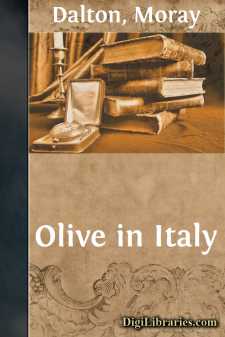Categories
- Antiques & Collectibles 13
- Architecture 36
- Art 48
- Bibles 22
- Biography & Autobiography 813
- Body, Mind & Spirit 142
- Business & Economics 28
- Children's Books 17
- Children's Fiction 14
- Computers 4
- Cooking 94
- Crafts & Hobbies 4
- Drama 346
- Education 46
- Family & Relationships 57
- Fiction 11829
- Games 19
- Gardening 17
- Health & Fitness 34
- History 1377
- House & Home 1
- Humor 147
- Juvenile Fiction 1873
- Juvenile Nonfiction 202
- Language Arts & Disciplines 88
- Law 16
- Literary Collections 686
- Literary Criticism 179
- Mathematics 13
- Medical 41
- Music 40
- Nature 179
- Non-Classifiable 1768
- Performing Arts 7
- Periodicals 1453
- Philosophy 64
- Photography 2
- Poetry 896
- Political Science 203
- Psychology 42
- Reference 154
- Religion 513
- Science 126
- Self-Help 84
- Social Science 81
- Sports & Recreation 34
- Study Aids 3
- Technology & Engineering 59
- Transportation 23
- Travel 463
- True Crime 29
Olive in Italy
by: Moray Dalton
Description:
Excerpt
CHAPTER I
“I believe that Olive Agar is going to tell you that she can’t pay her bill,” said the landlady’s daughter as she set the breakfast tray down on the kitchen table.
“Good gracious, Gwen, how you do startle one! Why?”
“She began again about the toast, and I told her straight that you always set yourself against any unnecessary cooking. Meat and vegetables must be done, I said, but those who can’t relish bread as it comes from the baker’s, and plain boiled potatoes, can go without, I said. Then she says, of course I must do as my mother tells me, and would I ask you to step up and see her presently.”
“Perhaps you were a bit too sharp with her.”
The girl sniffed resentfully. “Good riddance if she goes,” she called after her mother.
Mrs Simons knocked perfunctorily at the dining-room door.
A young voice bade her come in. “I wanted to tell you that I heard from my cousins in Italy this morning. I am going to stay with them for a little, so I shall be leaving you at the end of the week.”
The landlady’s cold stare was disconcerting. There was a distinct note of disapproval in her voice as she answered, “I do not know much about Italy.” She seemed to think it not quite a seemly subject, yet she pursued it. “I should have thought it was better for a young lady without parents or friends to find some occupation in her own country.”
Olive smiled. “Ah, but I hate boiled potatoes, and I think I shall love Italy and Italian cooking. You remember the Athenians who were always seeking some new thing? They had a good time, Mrs Simons.”
“I hope you may not live to wish those words unsaid, miss,” the woman answered primly. “You have as good as sold your birthright, as Esau did, in that speech.”
“He was much nicer than Jacob.”
“Oh, miss, how can you! But, after all, I suppose you are not altogether one of us since you have foreign cousins. What’s bred in the bone comes out in the flesh they say.”
“I am quite English, if that is what you mean. My aunt married an Italian.”
Mrs Simons’s eyes had wandered from the girl’s face to the heavy chandelier tied up in yellow muslin, and thence, by way of “Bubbles,” framed in tarnished gilt, to the door. “Ah, well, I shall take your notice,” she said finally.
She went down again into the kitchen. “I never know where to have her,” she complained. “There’s something queer and foreign about her for all she says. What’s bred in the bone! I said that to her face, and I repeat it to you, Gwendolen.”
Mrs Simons might have added that adventures are to the adventurous. Olive’s father was Jack Agar, of the Agars of Lyme, and he married his cousin. If Mrs Simons had known all that must be implied in this statement she might have held forth at some length on the subject of heredity, and have traced the girl’s dislike of boiled potatoes to her great-great-uncle’s friendship with Lord Byron, and her longing for sunshine to a still more remote ancestress, lady-in-waiting to a princess at the court of Le Roi Soleil....


